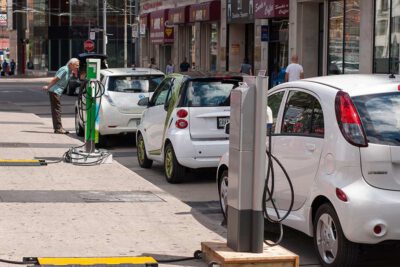
(CC BY-SA 2.0)
TORONTO, ON — Adam Thorn, Transportation Director at the Pembina Institute, made the following statement in response to Environment and Climate Change Canada's announcement on new zero-emission vehicles regulations, released today.
“We welcome the federal government's announcement of a zero-emission vehicle (ZEV) sales mandate. While a sales mandate has already been in place in some parts of the country, implementing a nationwide requirement that 20 per cent of vehicle sales be ZEVs by 2026, rising to 100 per cent of sales by 2035 is a game changer.
“We've seen the difference a ZEV sales mandate has made in British Columbia and Quebec where most of Canada's zero-emission vehicles are purchased. With a federal mandate, all Canadians will benefit from a greater supply of electric passenger vehicles, lower sticker prices over time as manufacturing scales up, and no longer being tied to the volatility of gas prices at the pump.
“Moreover, the sales mandate ensures market certainty meaning that building out charging infrastructure now comes with little risk, knowing that the number of electric vehicles on the road will increase significantly in the near future and that all new vehicle sales will be ZEVs by 2035.
“The Pembina Institute has long advocated for this policy. Transportation is the second highest generator of carbon emissions in Canada, second only to oil production. Between 2005 and 2019, total transportation emissions have risen by 14 per cent while automotive emissions alone have risen by 18 per cent. For Canada to meet its pledge to lower overall emissions by 40 to 45 per cent in less than 10 years, the greenhouse gases released into the atmosphere by the transport sector must be significantly reduced.
“We recognize, however, that the sales mandate is a supply-side regulation. Consumers will soon see cost parity between the purchase prices of electric and gas vehicles with ZEVs already cheaper to maintain over the lifetime of the vehicle.
“In the meantime — until parity is achieved — purchase incentives geared to household income could go a long way to help increase uptake and make clean passenger vehicle ownership viable at all income levels.”
The Pembina Institute
www.pembina.org










